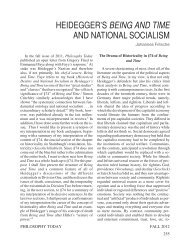SPINOZA'S VIRTUOUS PASSIONS
SPINOZA'S VIRTUOUS PASSIONS
SPINOZA'S VIRTUOUS PASSIONS
You also want an ePaper? Increase the reach of your titles
YUMPU automatically turns print PDFs into web optimized ePapers that Google loves.
768 MATTHEW J. KISNER<br />
One might try to sidestep the problem by conceiving of power as<br />
a capacity to act. Following this line of reasoning, one might think<br />
that the antivenom increases my power in the sense that it causes<br />
changes in my body which provide me with the capacity to act from<br />
my conatus, my essential causal powers, at a future time. This response<br />
is unsuccessful because it conceives of power in a way that is<br />
inconsistent with Spinoza, as something potential, contained but untapped,<br />
like the power in a battery. According to the conatus doctrine,<br />
at every moment, every thing expresses its power as much as<br />
possible. If one’s power fails to bring about a particular effect, this is<br />
not because the power is stored and unused, but rather because one’s<br />
power is countered in some way by the power of another thing. The<br />
only way that we could fail to express our power is if we were able to<br />
check our own power, which, according to 3p6, is impossible. Since<br />
Spinoza cannot admit the possibility of unexpressed power, he also<br />
cannot admit that the antivenom increases my power in the sense that<br />
it supplies me with a capacity to act at a future time. 23<br />
In explaining a more successful solution, we will first concentrate<br />
on passivity at the mental level, though we will presently generalize<br />
our claims to the case of bodies. The solution is based on the<br />
claim that even inadequate ideas involve some causal activity. I do<br />
not mean by this that inadequate ideas are causally efficacious, that<br />
they bring about change; rather, inadequate ideas represent some<br />
causal activity on the part of the mind that conceives them. This<br />
might seem counterintuitive: since adequacy is a measure of causal<br />
activity, it would follow that inadequate ideas have some degree of adequacy.<br />
24 However, Spinoza writes as though inadequate ideas can<br />
have some adequacy when he suggests that some inadequate ideas<br />
can be more or less adequate than others, for instance, claiming that<br />
some ideas are very inadequate (2p30). This way of thinking makes<br />
sense given Spinoza’s view about the particular knowledge offered by<br />
inadequate ideas. In order to have truly adequate knowledge of<br />
something particular, say q, one must have all the ideas of all of q’s<br />
23<br />
Of course, Spinoza might agree that the antivenom gives me the capacity<br />
to act better in the future; he just cannot regard this as an increase in<br />
one’s power, given his understanding of power.<br />
24<br />
I mean here that they represent causal activity, not causal efficacy. In<br />
other words, I mean that inadequate ideas represent the activity of the idea<br />
and the person having the idea, not that inadequate ideas have the power to<br />
cause changes in other things.
















